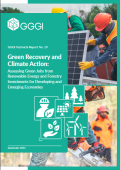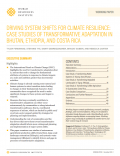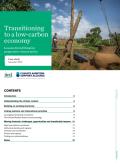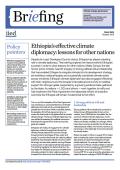



Forest cover in sub-Saharan Africa declined by nearly 10 per cent between 2000 and 2010. Of this loss, 75 per cent was caused by the conversion of forest to agriculture, largely for food production to serve rapidly growing domestic food demand. Focusing on Ethiopia, Ghana and Tanzania, this study examines...

Despite its Least Developed Country status, Ethiopia has played a leading role in climate diplomacy. This briefing explores the factors behind Ethiopia’s success in order to draw lessons for other nations. Meles Zenawi, the late former prime minister, has left a legacy of strong political will and leadership that has...

Ethiopia is known for its historic agriculture, but also for the associated, widespread, and ongoing land degradation. The older agricultural areas of the northeast have long been particularly affected, but the highest soil erosion rates are currently being observed in the western parts of the highlands. The processes of soil...
In the present report, good practices and lessons learned on inclusive green growth in selected sectors of the Ethiopian economy are documented. These served as input to the Fifth Issue of the Sustainable Development Report on Africa (SDRA-V), which was prepared under the theme “Achieving sustainable development in Africa through...
